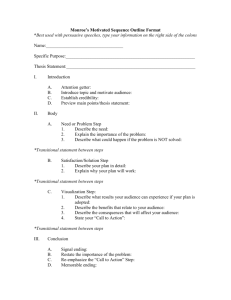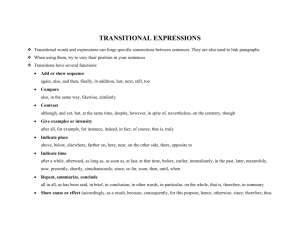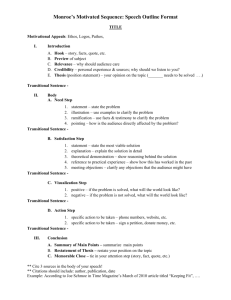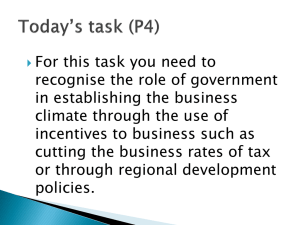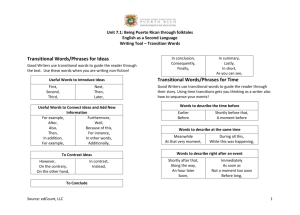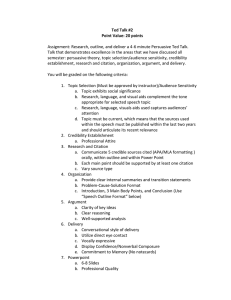(c) crown copyright Catalogue Reference:CAB/24/215 Image Reference:0003
advertisement
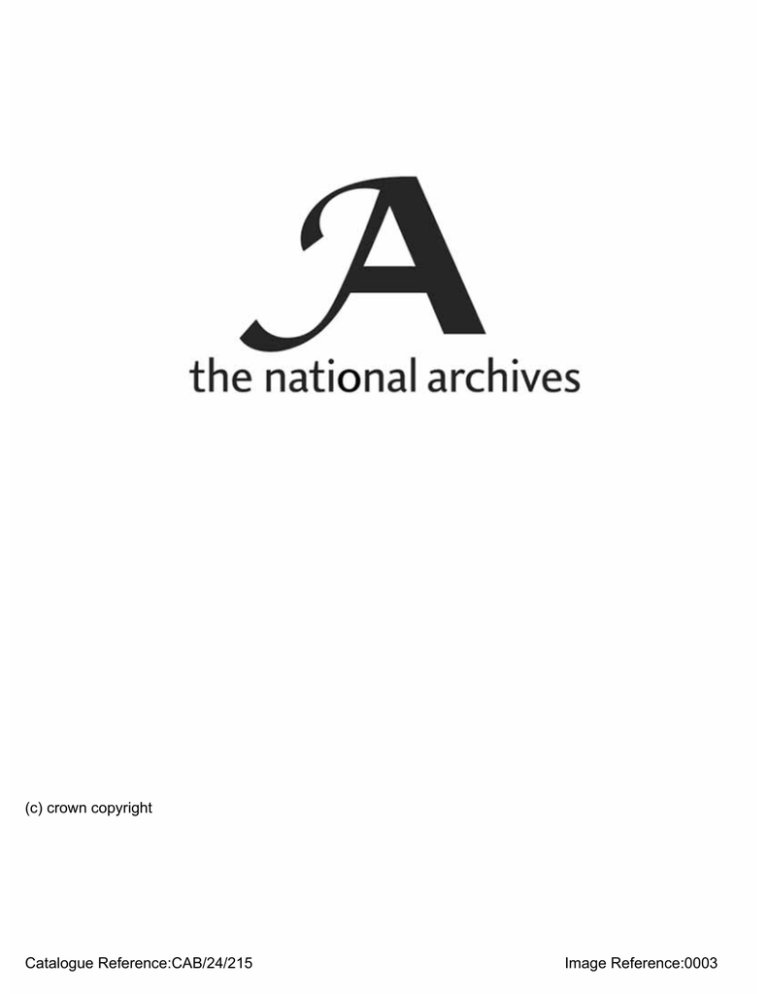
(c) crown copyright Catalogue Reference:CAB/24/215 Image Reference:0003 THIS DOCUMENT IS T H E PROPERTY OF HIS BRITANNIC M A J E S T V S GOVERNMENT. Printed for the Cabinet. October 1930. SECRET. Copy No. C P . 318 (30). CABINET. UNEMPLOYMENT INSURANCE. Legislation in the Immediate Future. MEMORANDUM BY THE MINISTER OF LABOUR. 1. I T is necessary to decide without delay the line we are to take in the immediate future on our Unemployment Insurance policy. While it is yet too early to say what will be the precise outcome of the advisory committee of the three P a r t i e s on unemployment insurance,* I think it may be assumed that there will be agreement in the view that there should be a review of the arrangements for assisting the able­ bodied unemployed, and that probably this review' should be made by a Royal Commission. This, however, will take time, and although I should hope to be able to speed up such a Commission and obtain their recommendations within twelve months, there would then have to be consideration of their report and the passing of the necessary legislation. Meanwhile, we have to deal with the position as it is to-day, and so far as the advisory committee is concerned, there is no common agree­ ment at present on what should be done pending the report of the Royal Commission. I cannot say how close we may be able to get in this respect, but as the Committee will be meeting again on the 23rd October, I should like to have guidance on the line which I should adopt. 2. The paper which I circulated to the Cabinet on the 9th July, 1930— C P . 235 (30)—contains a general survey of the difficult problems involved, particularly as regards transitional benefit. As the figures of expenditure are so large, it is perhaps advisable that I should recapitulate them here, with certain revisions based on recent data :—' Unemployment Insurance— ­ Debt at present ... Increasing at the rate of ... Contributions paid by workpeople Contributions paid by employers Contributions paid by Exchequer Cost of Ordinary benefit paid out of Fund Transitional benefit: Cost paid by Exchequer, which may be Total of Ordinary benefit paid out of the Fund and Transitional benefit paid by Exchequer (For every 100,000 the Live Register increases, the expenditure will increase at the rate of about £4,500,000 per annum) Public Assistance paid by Public Assistance Authorities ... Estimated payment likely to be made in the financial year 1930 £ 51,000,000 36,000,000 per annum. 14,000,000 16,000,000 15,000,000 77,000,000 21,000,000 98,000,000 5,725,000 in 1929. 2/3,000,000 per annum. * Attached as an Appendix is a copy of the minutes of the three meetings so far held. [21811] B 3. Certain things seem to be.obvious :— (1) The borrowing powers must be increased. The existing limit of £60,000,000 . . will be reached by J a n u a r y or earlier. W i t h a live register of over two millions and already a prospective charge upon the Exchequer this year of £36 millions, there is really no practicable alternative to.continued borrowing, unless we are prepared to face reduced benefits or increased contributions^ I should mention that a. further £10,000,000 borrowing power, making a total of £70,000,000, would not be likely to last beyond next March. Therefore more than this would be required, if yet another Bill for borrowing powers before the date of the next Budget is to be avoided. I t is a question, therefore, whether the amount of additional borrowing powers now to be sought should not be £20,000,000. (2) The transitional period begins to run out next April. The Advisory Committee started with a predisposition in favour of an intermediate scheme (i.e., something between the Unemployment Fund and the Public Assistance Committee but financed nationally like transitional benefit) for those for whom, so far, transitional benefit has catered. Such a scheme would be in the direction of making the unemployed a national charge, as contemplated in " L a b o u r and the N a t i o n " ; the same idea is included in the Liberal Yellow Book and was. referred to in the speeches of several Conservative Members last Session. Some of the problems which would be raised in fashioning such a scheme were reviewed in C P . 235 (30)—see, in particular, pages 5 to 7. After considering the problems, the scheme did not seem to find quite so much support in the Advisory Committee. Failing such a scheme, the transitional period must be extended. This is the only practicable means of avoiding throwing the burden on to the new Public Assistance Authorities. I t is suggested that these Authorities are not yet ready to take over additional duties and liabilities, and in any case we could not make this change before the Royal Commission had reported and advised as to terms and conditions. (3) The Royal Commission should be set up, to report as quickly as possible. I t should be noted, however, t h a t any legislation arising from a Royal Commission^ report is not likely to be passed till towards the end of the 1932 session. This will mean, unless something else is done meantime, very heavy financial commitments, viz., an additional expenditure on transitional benefit (which at present costs the Exchequer about £21,000,000 a year) for an extended period of a t least 18 months, and further borrowing in the neighbourhood of £36,000,000 a year so long as we have a Live Register of the present dimensions. 4. For these financial reasons and also for political reasons it is important to decide whether, pending the report of the Royal Commission, we should propose any amendments in the scheme in order to deal with alleged abuses. On the advisory committee the Conservatives have been pressing the view that the fund should be made to balance forthwith by reducing (arbitrarially and artificially) the numbers chargeable to the fund, and transferring the rest to the Exchequer. The Liberals * Reduction of Benefit.—A reduction of the rates of benefit is the most direct and probably the m o s t effective way of reducing expenditure. I t might be argued that justification for the reduction is to be found in the financial position of the Unemployment Fund and in that of the Country -generally. The cost of living has fallen considerably over the last few years, while the rate of benefit (over-all) has risen. Thus in 1924 the cost of living index was about 70 and the rate of benefit (man, ihis wife and two children) was 27/-. The cost of living is now down to 55 (with every prospect of falling below 50) and the rate of benefit is up to 30/-. A reduction of 2/- would result in a saving of about £9,000,000 per annum. Any reduction would, of course, be criticised as reactionary, and .the political difficulties are formidable unless there can be agreement between the Three Parties. Increase of Contributions.--The present contributions (for men) are : employer 8f7., employed 7d., Exchequer lid. I t may be argued that when the revenue of the Fund is so very much smaller than the expenditure steps ought to be taken to increase the revenue. This has been done in Germany (where, even before the increase, the ratio of contributions to wages was much higher than with us), and it seems to have been accepted as the natural thing to do. An increase of Id. all round would yield about £5A million additional revenue; an increase of 3d. all round would give about £164 million. The argument against increase in contribution is that it would mean an additional burden upon industry. On the other side it could be argued, however, that the feeling that the scheme is insolvent and is piling up a large debt, the liquidation of which may involve large charges upon the taxpayer, is itself unsettling to industry. No less unsettling is t h e view t h a t the Government are content to let such an insolvent situation continue without adequate efforts to cope with it. An increase of Sd. in the employees contribution is probably about one-quarter of 1 per cent, increase upon the cost -of production. incline to the view t h a t the Commission should be appointed on the basis that we are committed to the " p r i n c i p l e " that the fund should balance on the present live register. These proposals are so impracticable that I should not feel any difficulty in dealing with them in the House. A t the same time I should, of course, have to­ tell the House that the terms of reference to the Commission would be on the basis­ that the revised scheme is to be self-supporting. 5. In view of what I expect will be the attitude of both the Conservatives and the Liberals in the House when we propose the extension of the transitional period with additional borrowing powers, it would, I think, be advisable to say to the House that, while we feel bound to await the advice of the Royal Commission before making any considerable changes in the scheme, we intend to make such reasonable readjust­ ments as are practicable in the meantime. As to this, certain points particularly attract attention, notably, certain classes of claimants :— (a) Seasonal workers; (b) Short-time workers; and (c) Married women. As to seasonal workers, it is necessary to draw a distinction between two 6. types :­ (i) Where there is a busy season alternating with a slack season, as in the building, clothing and certain other trades. There are large numbers i n this class. This is, however, really one of the main types of unemploy­ ment for which the insurance scheme was intended to provide, and is not one of the things which attract public attention as an abuse, (ii) Where (as in herring fishing and curing, the sugar beet industry and fruit picking) the work is of a wholly seasonal character beginning and ending on some more or less definite date. The type in (ii) can be divided again into two groups :— (a) Where the workers work only during the season and do not seek employment at any other time or in any other district. (b) Where, while the main occupation is the seasonal, one, the workers seek to obtain, and sometimes succeed in obtaining, employment during the off season. The alleged abuse is that a number of people are said to be holding themselves out as seeking work during the off season, while they have no real thought of obtaining it. The numbers involved are comparatively small in any one industry or calling. The decisions which have been given by the Umpire run on lines with which little fault can be found. He has said that where the only work available in the district is the seasonal work, applicants must be held to be " n o t available for work " if their domestic circumstances prevent them from taking work at a distance from home. The numbers involved probably are not large compared with the total number of the unemployed; but comparatively few bad cases attract a good deal of attention, and I think that we might consider whether benefit should only be granted if the Court of Referees are satisfied that the claimant intends to obtain, and (having regard to the industrial circumstances in the district) can reasonably expect to obtain during the off season, employment in the district in which he or she is residing. 7. Short-time is a very different matter. Large numbers are involved. As some guide to the size of the problem, I give the following figures of the " temporary stoppages " * at four d a t e s : — Date. Males. Females. Total. J a n u a r y 21, 1929 ... ... 194,109 101,995 296,104 September 23. 1929 ... ... 180,089 85,538 265,627 January 27, 1930 ... ... 200,052 136,422 336,474 Percentage increase compared with previous year ... 3-1 33 - 7 13-6 September 22, 1930 ... ... 391,575 205,198 596,773 Percentage increase compared with previous year ... 117-4 139-9 124-7 * These are technically people whose unemployment is not expected to last longer than six weeks. They include short-timers unemployed on the day of the count. . . [21811] B 2 These figures, while, as I say, giving some guide, show only the number of claimants who were not working on the date when the count was taken. On the one hand, some of those temporarily stopped are not short-time workers in the ordinary sense; on the other hand, there are probably many short-time workers who were at work on the day of the count. 8. Short-time working as a means of meeting trade depression and avoiding the discharge of well-tried workpeople is a well established practice. I t was actually encouraged by the Government when the industrial depression began, doubtless in the belief that the depression would be short lived, and in December 1920 the Minister of Labour issued a circular letter to J o i n t Industrial Councils and other bodies stressing the advantages of short-time working as a method of alleviating unemployment. I n recent years there has been a greater resort to short-time working than in pre-war years. There is no definite evidence of the extent to which employers and workers may have exploited the unemployment insurance scheme, but there is a general impression that when employers find it necessary to curtail production they arrange short-time working in such a way as to enable the workers to satisfy the continuity rules for benefit. 9. The policy of short-time may be criticised on the ground t h a t it increases the ratio of over-head charges per unit of production and so prevents that reduction in costs which full production concentrated in the most efficient plants would make possible. The cotton industry is a prominent example in these respects. Short-time working may also conceal the real surplus of workers in a contracting industry and delay the necessary readjustment to changed conditions. The tendency to-day in rationalised industry is to discharge the least efficient workers and to give more regular employment to those retained in the service of the employer. 10. The question of the desirability of short-time working is a very involved one, and I feel that it would be dangerous and might prejudice the position to attempt to deal with it before the employers and employed in the industries mainly concerned have had an opportunity to give evidence to the Royal Commission. I t is to be remembered that a statutory rule directly penalising short-timers as such, under a precise definition, would probably lead to little immediate saving in benefit, because it would be evaded. The only result might be to influence the employers definitely to discharge their workmen and re-engage them at short intervals, instead of keeping them on their books and only working them when orders justified it, or otherwise adjusting their arrangements to meet the new rule. I t is further to be remembered that short-time working has enabled Lancashire in particular to carry on over a long period of exceptional depression without real distress. 11. The only rule which I can suggest as likely to be effective is that, where an applicant for benefit is an intermittent worker, benefit may be granted within the discretion of the Minister subject to the claimant proving hardship. 12. As to the third special class mentioned in p a r a g r a p h 5, viz.,married women, I have already furnished my colleagues, in O P . 240 (30), with the latest information available with regard to the numbers, distribution (geographically and industrially), marital condition and ages of women claimants, and there is nothing that I am able to add at this date on these points. The difficulty in dealing specially with married women as a class is that some industries, notably textiles, customarily employ them in large numbers.. This being the case, 1 think there can be no doubt that contributions must be levied in respect of them. Consequently, it is very difficult to say that they : shall not be entitled to benefit if they satisfy the same conditions as other insured contributors. I t is to be remembered, moreover, that it is the common habit in the textile trades in Lancashire for the women as well as the men to work in the mills, even though married. The family income consists of the earnings, or of contributions from the earnings, of all the members of the family, including the mother and ^daughters. In these circumstances, it is difficult to find a logical reason for refusing to allow the women, including the married women, to draw benefit, or to say that single women may draw benefit while married women may not. 13. A suggestion often made is that insured women on marriage should receive a refund of their past contributions (commonly called a dowry) and should not be entitled to benefit thereafter. I have examined this and am satisfied that it is not a practicable proposal. I t could not be made compulsory; that is to say, it could hardly be the law that no married woman could ever draw benefit. On the other hand, if the scheme were voluntary, the sum offered would be bound to be insufficient to attract women likely to draw any appreciable amount of benefit. The only women likely to take advantage,of the dowry would be those who would not have claimed benefit anyhow. I pass over other difficulties, e.g., what is to happen to the woman , who becomes a widow. . ; 14. While, therefore, a dowry is impracticable, I think that it might be possible to legislate on the lines that benefit shall not be payable to a woman after marriage until she has worked again for X weeks in an insured trade, and that even then benefit shall be limited to those who work in trades and in districts where married women are customarily employed. We might add to this that, before allowing benefit, the Court of Referees must be satisfied that a claimant who has so worked since marriage intends to obtain, and (having regard to the industrial circumstances in the district) can reasonably expect to obtain, employment in the district in which she is residing. 15. A p a r t from the special classes of workers dealt with in the preceding paragraphs, there is the general question whether any additional conditions should be applied by legislation to those claimants who are in receipt of transitional benefit —in particular, should there be any attempt to make the grant of such benefit discretionary ? There is little doubt that transitional benefit is at present being paid to some persons who, before the Act of last March, were getting along without it and without Poor Law relief. I t was pointed out in paragraph 7 of C P . 235 (30) that " since last February the number of persons in receipt of transitional benefit has increased from 140,000 to over 300,000; of this increase, 50,000 have come from the Poor L a w ; the others are, for the most part, persons who were not in receipt of benefit or of Poor Law relief, either because they were disqualified or because they had not applied for it. Thus, in transferring 50,000 persons from the Poor Law to State maintenance, a much larger number, 110,000, have been attracted in addition." There is possibility of a real saving being effected, and of what will commonly be regarded as the remedying of abuses, by leaving it to Ministerial discretion to grant benefit in those cases under the transitional provisions where hardship would be created by withholding it. I t may be urged, however, that such a proposal is a retrograde step and that, having recently abolished discretion as p a r t of the normal machinery of insurance, it should not be our policy to reintroduce it. 16. To sum up :— Subject to consideration of reduced benefits or increased contributions, I see no way of avoiding— (1) A further increase of £20,000,000 in the borrowing powers of the Unemployment Fund, making a total of £80,000,000. (2) A further extension of '' transitional benefit '' at heavy cost to the Exchequer. We should probably set up immediately— (3) A Royal Commission to review the whole field of unemployment insurance and the other arrangements for assisting the able-bodied unemployed. Pending the report of the Royal Commission— (4) We must decide whether to deal at once with alleged " a b u s e s , " and specially with— (a) Seasonal Workers; (b) Short-time Workers; (c) Married Women; (d) Transitional benefit in cases where no hardship would be created by withholding it. M. G. B. Ministry of Labour, October 10, 1930. [21811] APPENDIX. Proceedings of the Advisory Committee on Unemployment Insurance. P R E S E N T a t these meetings w e r e : — Rt, Hon. Margaret G. Bondfield, M.P., Sir Henry Betterton, Bart., C.B.E., Minister of Labour. M.P., R t . Hon- A. Greenwood, M.P., Minister Major W. E. Elliott, M.C., M.P. of Health. *Rt. Hon. Vernon Hartshorn, O.B.E., M.P., Lord Privy Seal. t M r . P. W. Pethick-Lawrence, M.P., Financial Secretary to the Treasury. Mr. A. E. Brown, M . P . Mr. I. Foot, M . P . * Attended 1st and 3rd' meetings. I Attended 3rd meeting only. Conclusions 1. The Minister of First Meeting held on July 28,. 1930. of Labour read the following agreed terms of reference ;— "To.receive from the Government a statement showing an analysis of the figures of unemployment, and the financial payments from the Exchequer, and to consider if it is possible to come to any agreement on the questions they raise. This does not include a wide national policy such as would necessitate the consideration of matters like safeguarding or any of the proposals dividing parties." She then described the problems with which the Advisory Committee would be faced. She emphasised t h a t if the transitional period was not extended for a further year it would be essential to legislate before Christmas. Consequently, if, as she hoped, the Bill to be introduced was to be an agreed Bill, the time which the Advisory Committee h a d to spend on the questions before them was, to this extent, limited. 2. I n the course of the discussion the following points emerged :— (a) W a s it desirable t h a t the transitional period should be continued if any practicable alternative could be found ? (b) Would a scheme which merely brought transitional benefit to an end with­ out further provision leaving those who would have obtained transitional benefit to seek relief from the local rates, receive the general assent of any party in the House? (c) Whether the solution of the problem in these circumstances might not be in the direction of an intermediate method of treatment which would involve a charge on the Exchequer and would make use of the Local Authorities in. the. analysis and. treatment of individual cases.. 3. I t was agreed that before further progress could be made by the Advisory Committee a closer analysis of the problem and of various subsidiary questions was essential, and the Government representatives undertook to circulate to the Advisory Committee as early as possible memoranda on the following points : — (a) An analysis, by age groups, by sex, by geographical. distribution, and by industrial occupations of those persons now claiming transitional benefit —the analysis to distinguish if practicable between those who might be regarded as normally inside and those outside the insurable field respectively. 1 (6) A note on the Brynmawr and Tonypandy experiments in the employment of men on voluntary work under the control of a voluntary agency while drawing Unemployment Benefit—the note to show the extent to which these experiments or similar experiments have been successful, how and in what manner it had been found practicable to employ men on work which normally would not have been work done for wages, and generally the degree to which it was desirable and possible to require service as a condition of the receipt of relief or benefit. (c) A note on the question whether the present conditions for the receipt of Unemployment Benefit tended to prevent claimants from looking for or accepting employment of a temporary a n d / o r non-insurable character, for example, haymaking. (d) A memorandum examining the various possible types of intermediate scheme for dealing with those now on transitional benefit—this note to be accompanied by a memorandum from the Treasury on the finance of the several schemes, and a note by the Minister of Health on the attitude which Local Authorities would be likely to adopt. 4. I t was suggested that it might be advisable for the Advisory Committee to he regarded as a Cabinet Committee or similar body, so t h a t it might have the assistance of the Cabinet Secretariat while its proceedings would be secret. 5. I t was agreed that the next meeting of the Advisory Committee should take place on the 8th September at 2-30 P . M . , and that the following dates should be reserved for further meetings of the Advisory Committee: — 9th September, 26th September and 27th September. N O T E . — T h e Prime Minister, in response to the suggestion contained in para­ graph 4, has defined the status of the Advisory Committee as follows :— " As p a r t of the series of advisory consultations which are taking place on subjects of an economic character, the facts and the meaning of the expenditure on unemployment in its more recent features are being examined by a body, upon which members of all parties sit, working under the conditions which regulate committees of the Advisory Economic Council. I must make it clear once more that these discussions are not conducted by Government Committees whose work is to prepare Government policy, but are conducted so as to put the Govern­ ment in possession of different points of view authoritatively stated.— " H a n s a r d , " Vol. 242, No. 187, July 30, 1930, Col. 493. Conclusions of Second Meeting held on September 8, 1930. Advisory Committee on Unemployment Insurance. 1. The Committee approved the note of the proceedings of the First Meeting (A.C.U.I. (30) 1st Meeting). Second Meeting. Note of Proceedings. The Minister of Labour drew special attention to the Prime M i n i s t e r s state­ ment on page 4 of the note. Analysis of Persons Claiming Transitional Benefit. (A.C.U.I. 1 (30).) 2. The Committee took note of the high percentage of persons in receipt of transitional benefit classified as belonging to the coal mining industry; the low percentage of men in the textile industries (no doubt due to the system of short time working); and the high proportion of married women in receipt of transitional, benefit in the North-Western and Midlands Divisions. They noted that 11,800 persons were shown as having paid less than five contributions during the period July, 1928, to May, 1930. Mr. Ernest Brown asked if a detailed classification could be given of the persons in this group. The Brynmawr and Tonypandy Experiments. (A.C.U.I. 2 (30).) 3. The Committee took note of the memorandum circulated by the Minister containing a report of the experiments at Brynmawr and Tonypandy, setting up voluntary labour schemes. They noted with regret that little had been done in connection with the schemes, and they agreed that although voluntary schemes should not be discouraged, the matter could not be pursued further in relation to this examination. The Effect of the Benefit (A.C.U.I. 3 (30).) Conditions on the Talcing of Temporary Work. 4. The Committee postponed consideration of this memorandum until further progress had been made with the general question. 5. Without expressing final views, the Committee made a general survey of the possible lines of action in regard to the Unemployment Insurance Scheme and Transitional Benefit. The main points of the discussion were as follows : - Proposals for dealing with Transitional Benefit Class. (A.C.U.I. 4 (30).) 6. The Committee were in agreement that it was of first importance to restore the prestige of the Unemployment Insurance scheme and to take steps to make it self-supporting. I t was important also that the general public should distinguish between real insurance and other forms of relief. A t present the distinction was hard to make except to the expert and on technical grounds. Outside the unemploy­ ment insurance scheme individual examination was necessary to determine what were individual needs as regards maintenance and remedial treatment. A flat rate of payment was quite unsuitable and " i n d i v i d u a l e x a m i n a t i o n " should include a test of means. 7. The Committee discussed the extent to which the Unemployment Fund was at present called upon to bear certain charges which were never intended to be put upon it when the scheme was framed. These included regular short time working­ over an extended period of time and methods of arranging work so as to take advantage of the continuity rules. The Minister of Labour agreed that these were serious questions which would have to be watched; at the same time it was necessary to weigh up the relative advantages of short time working against permanent unemployment before making any drastic change. 8 . Unemployment Insurance.—The Committee recognised that there were good reasons for not raising contributions and not reducing benefits. The only other alternative was to vary the conditions so as to limit the number of persons who could qualify for ordinary benefit. I n order that they might examine the possibilities in this direction, the Committee asked that they might have information for the next meeting to show the effect on the numbers in receipt of unemployment benefit of the following proposals :— (a) The amendment of the continuity rules whereby benefit would be paid only in respect of six consecutive days of unemployment. (b) A first statutory condition requiring 35, 40, 45, 50, &o, contributions to have been paid in the last two years. (c) W h a t ratio of benefit to contributions would reduce the number in receipt of benefit to a balancing point of 1,200,000 persons. For the purpose of this information the fact that the Unemployment Fund is in debt should be ignored. 9. The Transitional Benefit Class.—The Committee realised that this was a problem mainly of the depressed areas. The class included many persons who were inefficient and who were not likely to be re-employed in industry, but had retained an industrial classification. As pointed out in C P . 235 (30), there was little to choose between them, and, on the one hand, many of the persons in more prosperous areas who had thirty contributions, and, on the other, uninsured persons. 10. The Minister of Health suggested that in any event Public Assistance Authorities would not be in a position to administer a scheme dealing with persons now in receipt of transitional benefit for at least two years, and it was not possible to transfer persons in this class to the Public Assistance Authorities as the Local Authorities were fully occupied with the reform of the local government. 11. As regards finance, the Minister of Health said that Local Authorities had for a long time pressed that the relief of the unemployed should be a national charge, and any suggestion that they should resume financial responsibility for those transferred from the Poor Law by reason of the 1930 Act, as well as a considerable number in addition, would meet with the strongest resistance. I t was axiomatic that administration by a local body without a considerable measure of local financial responsibility was a dangerous expedient. Major Elliot agreed with the Minister of Health in these general conclusions, in the light of his experience at the Scottish Office. 12. The Committee were, therefore, thrown back upon the proposal t h a t the transitional benefit class should be provided for by a scheme intermediate between Unemployment Insurance and the Poor Law, which would be subject to central control, but which would at the same time provide for individual examination of the c l a i m a n t s needs, both as regards maintenance and remedial treatment. They thought that it might be possible for such a scheme to be administered by the Employment Exchanges with the assistance of the Investigation Staff of the local Authorities. The machinery for deciding claims and rates of payment must, however, be quite distinct from the machinery for determining claims for benefit under the insurance scheme. Major Elliot suggested that the machinery might consist of a local body on which employers, workers, public men, the Local Authority and the Employment Exchange were represented. 13. The Minister of Health reminded the Committee that any decision they might take would have far-reaching results. He doubted if the public mind was proper 1^ prepared for the acceptance of a scheme of this kind, or whether the Committee would be justified in advancing these proposals without more considera­ tion than they could afford themselves to give, and without hearing the views of outside interests. H e thought that a more formal enquiry.—possibly in the form of a Royal Commission which could take evidence in public and survey the whole field of unemployment insurance and other forms of relief—might be set up and required to report by a certain date. Pending their report, Parliament might be asked to -continue the existing arrangements on a temporary basis. In reply to Sir Henry Betterton, the Minister of Health undertook to circulate a, note to the Committee explaining his proposal. 14. Major Elliot said that, while he had no objection to the fullest possible enquiry by a Royal Commission, he felt that it was undesirable to ask Parliament for further borrowing powers for the Fund and for a supplementary estimate in respect of transitional benefit, without making some change in the existing arrange­ ments. He thought that the legislation to be introduced next session should make the Fund self-supporting, and clearly distinguish the transitional benefit class from the insurance scheme. There would then be a clear-cut problem to consider. Public opinion might not tolerate a continuation of the present anomalies and an increase of the deficit on the Fund. Mr. Foot agreed that the Committee must put forward some proposals to deal with the problem in addition to a reference to a Royal Commission. 15. The Committee agreed to meet again at 10-30 A.M. on the 26th September. In view of the financial considerations involved, they decided to invite the Financial Secretary to the Treasury to attend the next meeting. In the meantime the Minister of Labour undertook to examine Departmentally the practicability of an inter­ mediate scheme on the lines discussed and to circulate a note to the members before the meeting, together with the other material desired. Conchisions of Third Meeting held on September 26, 1930. I t was agreed to substitute for the words " T h e Committee agreed," at the beginning of paragraph 10 of the Conclusions of the Second Meeting, " The Minister of Health suggested." Attention was called to notices which had appeared in the Press purporting to report the proceedings of the Committee. I t was suggested that it might be advisable to issue to the Press after each meeting a brief official account of what had taken place at such meeting. I t was, however, finally agreed that no statements at all should be made, either by members of the Committee or by the Cabinet Secre­ tariat, or by the Ministry of Labour, or anyone else. The Memorandum A.C.U.I.7 (30)—"Suggested Intermediate S c h e m e " - w a s read out by the Minister of Labour and a general discussion followed. I t was generally agreed that it was necessary to have a thorough review of the arrange­ ments for assisting the able-bodied unemployed and that this should probably be done by means of a Royal Commission. The immediate question, however, was, what is to be done pending such a Commission's Report ? The Committee explored three suggestions for dealing with this. One suggestion, which was supported by the Ministers of Labour and Health and the Lord Privy Seal, was that, pending the Report of the Royal Commission (which should be asked to report within six months or a year), there should be any necessary borrowing Bill for the Unemploy­ ment F u n d and a simple prolongation of the transitional conditions. The second suggestion, which was pressed by Sir Henry Betterton and Major Elliot, was that, while the transitional period should be extended and there should be any necessary borrowing, any Bill to effect this should be accompanied by provisions aiming at (1) reducing the numbers on the Unemployment Fund to balancing point and transferring the balance to the Exchequer, (2) remedying minor abuses, both of the Unemployment Insurance Scheme proper and of the transitional provisions, and (3) making quite clear the distinction between unemployment insurance and transitional benefit. The t h i r d suggestion, which was made by Mr. Foot, was that, m yoing to the House for further borrowing powers, while the Government should not make any other changes in the scheme, pending the proposed enquiry, it should commit itself definitely to the policy of making the Unemployment Fund balance on the present live register. The Minister of Health added that it should also commit itself to the policy of providing for those who would be cut off by any such balancing. I t was finally agreed t h a t the three Parties should separate in order to discuss the matter with their colleagues and' should meet again at 10-30 A.M. on Thursday, the 23rd October. The Minister of Labour promised to try to let the Committee have at its next meeting a return dealing with seasonal workers and also a note giving what information the Department had as to the truth about the allegation that it is impossible, owing to the Unemployment Insurance Scheme, to get labour for the harvesting. I n addition, Major Elliot asked for estimates as to the effect of adjusting rates of benefit to the cost of living, and Sir Henry Betterton asked t h a t the previous memoranda with regard to a change in the rule about contributions might be re-examined to see whether the basis upon which they had been drawn up was one relating to a rather exceptional period and, if so, whether a more normal period could be taken. o

